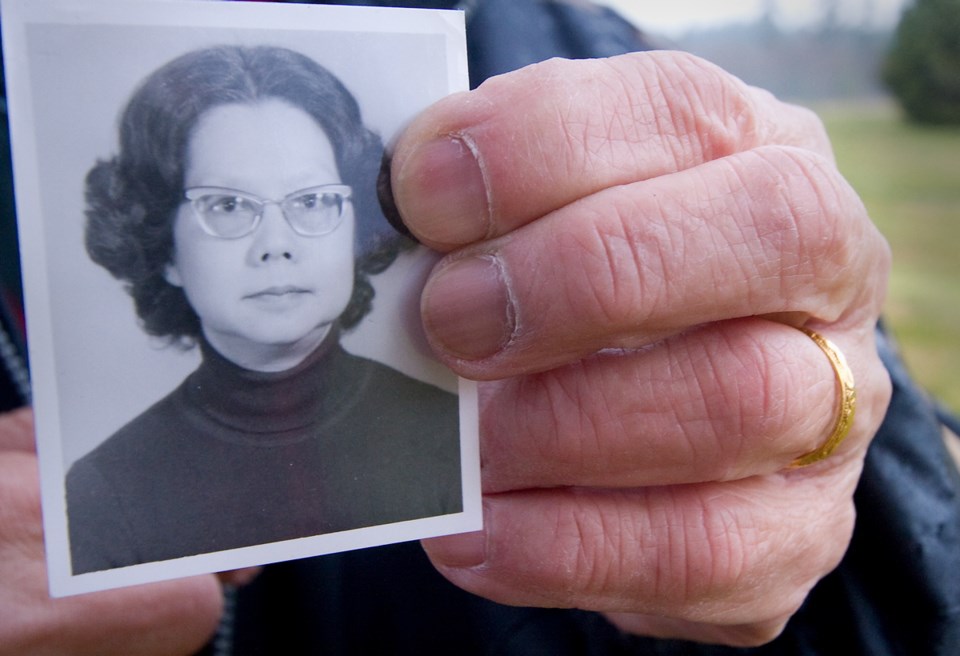More than 4,000 days later, Chan Yung Tong’s love story continues.
The 81-year-old adores his wife as much — more — than when they wed.
The proof is in the path he has worn through the Royal Oak cemetery lawn. It’s in the patch of flattened grass where he stands beside her grave, every single morning, just as he promised her he would before she died in 2001.
“I come every day,” he said Wednesday, leaning on his cane halfway up the hill to the burial park. He has made the journey without fail, save for a couple of trips lost to sickness and a couple of others when the buses didn’t run from Esquimalt.
Why?
“Because I love her.”
It wasn’t always that way. Chan — he writes his name in the Chinese custom, surname first — and Katima Amy Ismail didn’t pay much attention to each other in 1957 when they met at the Hong Kong shipping company where both worked.
Their backgrounds differed. She was the top boss’s secretary, while he toiled down in the trenches. Katima was Muslim, descended from a man who came from India with the British Army during the Opium Wars. (Chan never did adopt her faith; giving up pork was as close as he got.)
It wasn’t until Chan, perusing the newspaper ads, declared his desire to see a movie, and Katima said she did, too, that they went out together — though she was a little surprised when asked to pay for her own $2.40 ticket.
What followed was hardly a whirlwind romance. It was months before they even held hands. Then one day, navigating a slippery sidewalk, she took his arm. They married on March 11, 1959.
If complications from surgery left her unable to conceive, being childless also left the couple free to travel, which they did extensively: Europe, Asia and a series of trips to Victoria, where Chan had a younger sister. Katima was initially a little leery of relocating to this far-off, chilly place, saying that the only Hong Kong people who emigrated across the Pacific were those with offspring here; still, she agreed to the move after a sun-drenched Expo 86 trip.
Maybe it was because they had only each other, so far from home, but the Chans grew closer and closer — right up until death tore them apart on Oct. 6, 2001, the day her heart stopped and his broke. As the end neared in Royal Jubilee Hospital, he would ask her, “You hate me?” She would shake her head, no. “You love me?” A nod, yes.
“When she pass away, I hold her hand,” he said Wednesday, tugging at his green ball cap. “I still miss her.”
Chan, a private man, is a little reluctant to retell a story that drew unwanted attention when he shared it once before. The cemetery workers know it, though. So do the bus drivers on the No. 6 route. Chan is a familiar sight working his way up Falaise Drive on a cane that is a reminder of the time he twisted his back carrying mortar bombs while serving in the Hong Kong Regiment.
The injury didn’t seem like a big deal at the time, but he feels it now. Three times in the past couple of winters he has fallen in the snow while making the daily, half-hour trek from bus to cemetery. Growing older, he says he worries about becoming ill with no one to care for him, but does not fear the end itself. “I’m not afraid to die.”
Maybe he’ll be reunited with Katima, the woman who never, ever complained about anything. Or maybe they’ve never really been apart: A passing dog-walker once told him he saw a woman standing with Chan beside the grave.
Asked if he has advice for those of us still fortunate enough to share Valentine’s Day with our loved ones, Chan replies: “To be good, honest, always respect.”
His real message is unspoken. People might die, but true love lives on.



